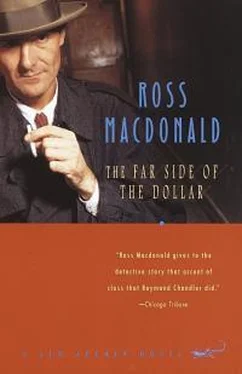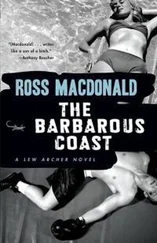Robert Brown was Carol’s father. Mike paid him back for his kindness eventually by running away with his daughter.
“How old was Mike then?”
“Twenty or so. Let’s see, it was about a year after they drafted him into the Navy. Yeah, he’d be about twenty. Carol was only sixteen.”
“Where were you at the time?”
“Working here in Los Angeles. I was 4-F. I had a job taking pictures for a hotel.”
“The Barcelona Hotel,” I said.
“That’s right.”
He sounded a little startled by my knowledge of his life. “It wasn’t much of a job, but it gave me a chance to freelance on the side.”
“I understand that Carol and your brother stayed there, too.”
“For a little. That was when he was AWOL and hiding out. I let them use my room for a couple of weeks.”
“You’ve done a lot for your brother in your time.”
“Yeah. He paid me back by trying to frame me for stealing a Navy camera. There’s one extra thing I could have done for him.”
“What was that?”
“I could have drowned him in the river when he was a kid. That’s all the use he’s been to anybody. Especially Carol.”
“Why did she stick to him?”
He groaned. “She wanted to, I guess.”
“Were they married?”
He answered slowly. “I think so. She thought so. But I never saw any papers to prove it.”
“Lately,” I said, “they’ve been calling themselves Mr. and Mrs. Robert Brown. The car he left with you is registered to Robert Brown.”
“I wondered where he got it. Now I suppose I’ll have to give it back to the old guy.”
“First the police will be wanting it.”
“Yeah. I guess they will at that.”
The thought of the police seemed to depress him profoundly. He sat without speaking for a while. I caught a glimpse of him in the headlights of a passing car. He was sitting with his chin on his chest. His body appeared to be resisting the movement which was carrying him toward his meeting with the police.
“Do you know Carol’s father?” I asked him finally.
“I’ve met Mr. Brown. Naturally he holds Mike against me. God knows what he’ll think of me now, with Carol dead and all.”
“You’re not your brother, Harold. You can’t go on blaming yourself for what he’s done.”
“It’s my fault, though.”
“Carol’s death?”
“That, too, but I meant the kidnapping. I set it up for Mike without meaning to. I gave him the idea of the whole thing.”
“How did you do that?”
“I don’t want to talk about it.”
“You brought it up, Harold. You seem to want to get it off your chest.”
“I’ve changed my mind.”
I couldn’t get him to change it back. He had a passive stubbornness which wouldn’t be moved. We drove in complete silence the rest of the way.
I delivered Harold and the five hundred dollars to Lieutenant Bastian, who was waiting in his office in the courthouse, and checked in at the first hotel I came to.
AT NINE O’CLOCK in the morning, with the taste of coffee still fresh in my mouth, I was back at the door of the lieutenant’s office. He was waiting for me.
“Did you get any sleep at all?” I said.
“Not much.”
The loss of sleep had affected him hardly at all, except that his voice and bearing were less personal and more official. “You’ve had an active twenty-four hours. I have to thank you for turning up the brother. His evidence is important, especially if this case ever gets into court.”
“I have some other evidence to show you.”
But Bastian hadn’t finished what he was saying: “I talked the sheriff into paying you twenty-five dollars per diem plus ten cents a mile, if you will submit a statement.”
“Thanks, but it can wait. You could do me a bigger favor by talking Ralph Hillman into bankrolling me.”
“I can’t do that, Archer.”
“You could tell him the facts. I’ve spent several hundred dollars of my own money, and I’ve been getting results.”
“Maybe, if I have an opportunity.”
He changed the subject abruptly: “The pathologist who did the autopsy on Mrs. Brown has come up with something that will interest you. Actual cause of death was a stab wound in the heart. It wasn’t noticed at first because it was under the breast.”
“That does interest me. It could let Harley out.”
“I don’t see it that way. He beat her and then stabbed her.”
“Do you have the weapon?”
“No. The doctor says it was a good-sized blade, thin but quite broad, and very sharp, with a sharp point. It went into her like butter, the doctor says.”
He took no pleasure in the image. His face was saturnine. “Now what was the evidence you referred to just now?”
I showed Bastian the piece of black yarn and told him where I had found it. He picked up the implication right away: “The trunk, eh? I’m afraid it doesn’t look too promising for the boy. He was last seen wearing a black sweater. I believe his mother knitted it for him.”
He studied the scrap of wool under his magnifying glass. “This looks like knitting yarn to me, too. Mrs. Hillman ought to be shown this.”
He put the piece of yarn under glass on an evidence board. Then he picked up the phone and made an appointment with the Hillmans at their house in El Rancho, an appointment for both of us. We drove out through morning fog in two cars. At the foot of the Hillmans’ driveway a man in plain clothes came out of the fog-webbed bushes and waved us on.
Mrs. Perez, wearing black shiny Sunday clothes, admitted us to the reception hall. Hillman came out of the room where the bar was. His movements were somnambulistic and precise, as if they were controlled by some external power. His eyes were still too bright.
He shook hands with Bastian and, after some hesitation, with me. “Come into the sitting room, gentlemen. It’s good of you to make the trip out here. Elaine simply wasn’t up to going downtown. If I could only get her to eat,” he said.
She was sitting on the chesterfield near the front window. The morning light was unkind to her parched blonde face. It was two full days and nights since the first telephone call on Monday morning. She looked as if all the minutes in those forty-eight hours had passed through her body like knots in wire. The red piece of knitting on the seat beside her hadn’t grown since I’d seen it last.
She managed a rather wizened smile and extended her hand to Bastian. “Ralph says you have something to show me.”
“Yes. It’s a piece of yarn, which may or may not have come off your boy’s sweater.”
“The black one I knitted for him?”
“It may be. We want to know if you recognize the yarn.”
Bastian handed her the evidence board. She put on reading glasses and examined it. Then she put it aside, rose abruptly, and left the room. Hillman made a move to follow her. He stopped with his hands out in a helpless pose which he was still in when she returned.
She was carrying a large, figured linen knitting bag. Crouching on the chesterfield, she rummaged among its contents and tossed out balls of wool of various colors. Her furiously active hand came to rest holding a half-used ball of black wool.
“This is what I had left over from Tom’s sweater. I think it’s the same. Can you tell?”
Bastian broke off a piece of yarn from the ball and compared it under a glass with my piece. He turned from the window: “The specimens appear identical to me. If they are, we can establish it under the microscope.”
“What does it mean if they are identical?” Ralph Hillman said.
“I prefer not to say until we have microscopic confirmation.”
Hillman took hold of Bastian’s arm and shook him. “Don’t double-talk me, Lieutenant.”
Читать дальше












